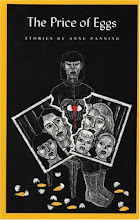
One thing that’s important to me as a fiction writer is a certain inclusion in terms of character. I much prefer stories told by those not often granted a voice. Growing up in a trailer court, my family didn’t have a telephone. The reason was purely financial: we couldn’t afford one. I remember my bedroom windows faced the graveyard and a dead-end road. There was a loneliness that pervaded my days, and I spent a great deal of time either looking out at the gravestones or reading. Looking back, I can see how this lack of a telephone influenced me as a writer. Without a phone, I wasn’t heard or heard from. We were all, I remember thinking, essentially silenced. Instead, I read and filled my head with other voices, but that need, that pressing need, for all of us to be heard, to be recognized by the larger world, stayed with me.
As the late Frank O'Connor wrote of the short story: “…the modern short story is a genre that deals with members of ‘submerged population groups,’ excluded by one means or another from living in the certainties of civilization-- people of a minority, outsiders, marginalists, for whom society provides no place or means of self-respect.”
Many of my characters in my book, Super America, reflect this:
•a postal carrier injured by a pit bull on her route
•an elementary school lunch lady
•a gay hairdresser
•the ATV driving, gun-toting “hillbillies” who disrupt a quiet suburban subdivision
•a pregnant college student waitress
Having grown up in a family in which both parents floated from one menial job to another, I almost always end up focusing on issues of class in my fiction. Also, I’m intrigued by the way education (especially advanced degrees) can create isolation, alienation, and even resentment. In my book’s title story, “Super America,” Theo, a theatre major, is picked up by his ne’er-do-well father for spring break. On the drive home, the father says, “Don’t talk college. That was my one rule about you going off to the Cities like that. Don’t be an ass. You got to talk normal. You gotta stay who you are.”
Fiction, particularly short fiction, has always been a means for me to work out the tension and alienation of class. I think short fiction works so well for this because, as Frank O’Connor also says: “What makes the short story a distinct literary form is ‘its intense awareness of human loneliness.’” I try to teach this elusive idea every semester in my writing workshops, it seems, but how do you train students to pour human loneliness into a short story? How do you get student writers to even accept and acknowledge human loneliness?
Writing about her own work, Eudora Welty once said, "What I do in writing of any character is to try to enter into the mind, heart, and skin of a human being who is not myself. Whether this happens to be a man or a woman, old or young, with skin black or white, the primary challenge lies in making the jump itself."
I want to make that jump; I want to amplify silent voices.
There’s a woman in my hometown in Minnesota who shows up at all the grand openings and ribbon cutting ceremonies with her 110 camera. She’s tall and willowy with stringy gray hair. She wears old-fashioned blouses and skirts with white anklets and brown lace-up shoes. She snaps millions of pictures, then takes the film cartridges to Rexall Drug for developing. She lives alone. She wears bandannas tied under her chin. She keeps a folded hankie squeezed into her hand at all times.
There’s a man in Brockport we call “The Security Guard.” He looks a lot like Charles Manson, follows all the postal carriers around town, and pretends to talk into a fake walkie-talkie. He thinks he’s protecting us all. He’s crazy, yes; he salutes every car that passes; he has gold chevrons sewn to the sleeves of his dirty jacket; occasionally, he jumps on his bike and hurries away in a panic as if someone's chasing him. Sometimes I watch him pacing with his walkie-talkie in front of my house and wish so badly I could hear what's going on in his head.
The telephone is ringing.


.jpg)
jianbin0901
ReplyDeleteugg outlet
michael kors factory outlet
michael kors outlet online
fitflops clearance
basketball shoes
michael kors outlet clearance
uggs on sale
cartier sunglasses
fitflops clearance
louis vuitton handbags
ugg boots
moncler outlet
toms shoes
rolex outlet
louis vuitton pas cher
michael kors uk
nike outlet store
ugg outlet
cheap football shirts
longchamp solde
omega outlet
lululemon outlet
cheap ray ban sunglasses
adidas nmd
sac louis vuitton pas cher
prada outlet
ed hardy clothing
ferragamo shoes
soccer jerseys wholesale
ray ban sunglasses
longchamp handbags
coach outlet clearance
pandora jewelry